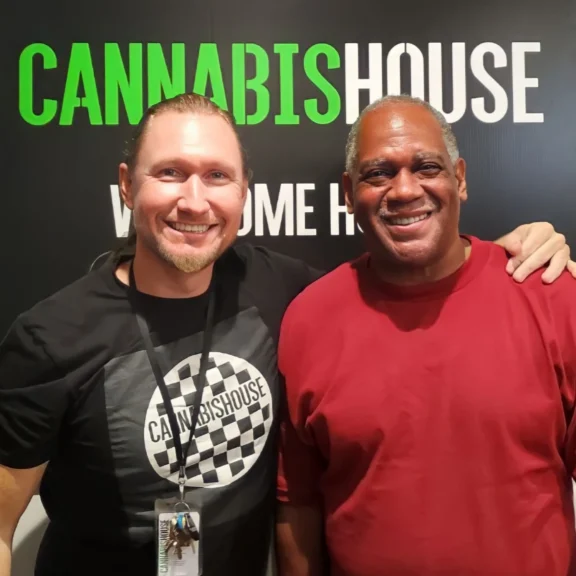Owner Spotlight: Rabin Woods & Chasom Brown

Cannabis House
Jurisdiction: Los Angeles
Photo of Chasom Brown (left) and Rabin Woods (right), owners of Cannabis House
“The equity program has given me this opportunity to participate in the legal cannabis industry and because of that I was blessed to find a partner in Chasom that wanted a real partnership. Once the opportunity came, it changed my life.”
– Rabin Woods, Cannabis House
Rabin Woods and Chasom Brown are equity partners at Cannabis House, a retail cannabis business in Los Angeles. Their goal to create a successful business and a community that paves the way for a more equitable and sustainable cannabis industry.
In 1983, Woods was arrested for a cannabis-related offense. Today, he is the majority owner of Cannabis House. Brown compliments Woods with his years of experience in the cannabis industry, corporate finance, and navigating regulatory structures as a retail operator.
“You can take the word cannabis out of it. Treat it like a business. You have to come into it knowing that starting a business is hard and that most businesses fail. You have to make good decisions. You have to be smart with money. You have to have your accounting down, just like in any normal business. Your partner can’t be your adversary. Your partner should be your partner. You should be standing back-to-back fighting together, or you’re doomed.”
— Chasom Brown, Cannabis House
To guarantee those negatively impacted by the War on Drugs can participate in the cannabis industry, some jurisdictions have made equity program participation a requirement for applying for specific license types.
Los Angeles began issuing licenses to equity applicants in phases. Many of these phases limit license applications and specific license types to those who have been verified through Los Angeles’ equity program. This exclusivity period has allowed those harmed by cannabis criminalization the space to establish a business, find a location, and meet potential investors before applications open to the public.
In 2022, the Long Beach City Council approved a resolution to allow for non-storefront retailer license types in the city, and at the same time, made those delivery licenses exclusive to equity applicants. In doing so, Long Beach sought to fulfill the promise of recreational legalization to create an industry where those harmed by cannabis criminalization have a greater opportunity in the regulated market.
“An approval or a license is a seat at the table; all involved need to work together to create an actual business.”
— Chasom Brown, Cannabis House
Equity-exclusive license types or equity-exclusive licensing phases create opportunities for equity businesses to participate in the cannabis industry by reducing barriers. When equity businesses don’t need to worry about competing with non-equity applicants, they can focus on creating a business that meets their community’s needs.
Equity-exclusive licensing is useful in jurisdictions with a large pool of equity applicants. Equity entrepreneurs, who would otherwise have limited opportunities to participate in the regulated cannabis industry, are instead prioritized. By limiting license types or creating licensing phases exclusive to equity businesses, jurisdictions can reduce competition for a cannabis license between equity and non-equity businesses. When jurisdictions adopt equity-exclusive licensing policies, they indicate they value a diverse and equitable cannabis business community.
“I still believe in the ‘Spirit of Social Equity,’ and I believe that I was blessed to survive this quagmire to show others coming after me where the landmines are and how to navigate through them to the finish line and beyond.”
— Rabin Woods, Cannabis House
Read more Promising Practices
Promising Practice: Equity-exclusive Licensing
Rabin Woods and Chasom Brown are partners at Cannabis House, a retail storefront in Los Angeles. They are using their unique backgrounds operations, finance, and civic engagement to create a space that supports their community and helps uplift other cannabis business entrepreneurs.
Promising Practice: No-interest revolving loans
Maisha Bahati is the CEO of Crystal Nugs, the first Black and woman owned non-storefront delivery business in Sacramento. She was one of the first equity applicants in Sacramento’s Cannabis Opportunity Reinvestment and Equity (CORE) Program and is in the process of expanding her business with a retail storefront.
Promising Practice: Direct Grants
Reese Benton, owner of Posh Green Cannabis Boutique, worked with the City of San Francisco Office of Cannabis’ equity program to obtain a license and open her boutique. As an advocate for cannabis equity, Benton has turned Posh Green Cannabis Boutique into a hub for knowledge and products from other equity businesses.
Promising Practice: Technical Assistance
Carrie Broadus, owner of Pot Luck Enterprises, took advantage of Los Angeles’ technical assistance program to learn how to navigate the local permitting process and form a locally verified equity business. Broadus now uses the knowledge gained from the technical assistance program to advocate for cannabis equity in her community.
